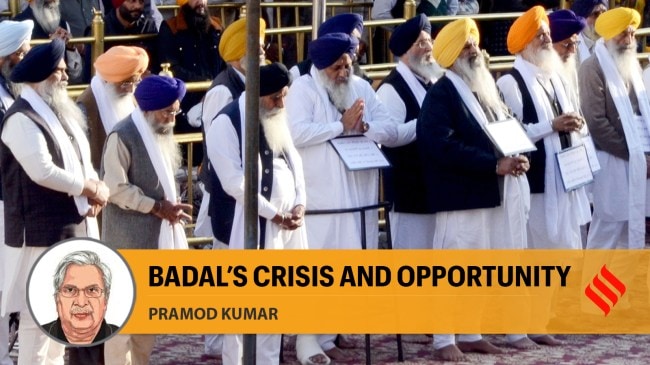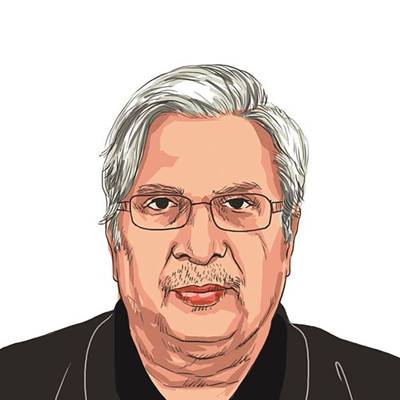Opinion Post Akal Takht verdict, Sukhbir Singh Badal’s crisis and opportunity
The SAD has evolved into a party that represents and asserts a wider Punjabi identity. Its real test now is – can it move past panthic issues and be a party for all?
 Sukhbir Singh Badal with others. (Express photo by Rana Simranjit Singh)
Sukhbir Singh Badal with others. (Express photo by Rana Simranjit Singh) Punjab politics has long vacillated between assertions of a Sikh identity that seeks to reclaim a declining political and economic hegemony and a secular Punjabi identity. For the last decade or so, the Shiromani Akali Dal (SAD) has been embroiled in panthic issues that have eroded its support base amongst both Sikhs and non-Sikhs. Its performance in the 2022 assembly and 2024 Parliament elections was dismal. Now the Akal Takht verdict on it has posed a challenge for the SAD to reclaim its moderate space, which, after the 1997 Moga declaration, has widened to include all Punjabis, including Hindus and Scheduled Castes, into its fold.
The highest spiritual authority of Sikhs holding a weakened SAD accountable for its decisions in power between 2007 to 2017, is a historic moment. For the first time, the Akal Takht summoned former Akali Cabinet ministers, as well as the SAD’s core committee members and office-bearers, and asked them to explain their actions and inactions in government. The religious clergy, the five jathedars, made these leaders stand before the Akal Takht and answer in ‘yes’ or ‘no’ to the questions posed to them.
The Akal Takht Jathedar posed the following questions to Sukhbir Singh Badal: Have you committed the sin of ignoring the sacrifices of martyrs on panthic issues; promoting officials responsible for the killing of Sikhs; giving party tickets to their family members for elections; getting cases against Dera Sacha Sauda head Gurmeet Ram Rahim cancelled; granting a pardon to the Dera Sacha Sauda head without his seeking it, and reportedly calling the jathedars to your Chandigarh residence for this purpose; not bringing to justice those responsible for the sacrilege of the Guru Granth Sahib; misusing the Guru’s golak by instructing the SGPC to incur expenses on newspaper advertisements to justify the pardon granted to the Dera head?
After due deliberations, the Akal Takht declared the ministers and other core committee members as tankhaiya (a sinner who has violated the rehat maryada). Sukhbir Singh Badal was declared tankhaiya three months earlier. The decisions of the Akal Takht were divided into two parts — religious punishment and political prescription. In the religious domain, it ranged from cleaning of gurudwara premises and toilets, and polishing shoes to helping in the community kitchen. This practice of excommunication and atonement started in the pre-Independence era — in 1802, Maharaja Ranjit Singh was declared a tankhaiya and given flogging as punishment. However, the punishment was lifted after an apology.
The other pronouncements were political in nature. The Akal Takht said that the leadership of the SAD has lost its moral authority to lead the Sikh panth politically due to its actions, and that the SAD’s politics since 1997 had failed to serve the community’s interests. It criticised its inability to secure justice for victims of post-1984 atrocities and accused the SAD leadership of undermining the integrity of Sikh institutions, including the Akal Takht, Shiromani Gurdwara Parbandhak Committee, and the SAD itself.
The Jathedar directed the SAD working committee to accept the resignation of party president Sukhbir Singh Badal, earlier rejected by the state level committee. It directed that the resignations of two former ministers, NK Sharma and Anil Joshi, be accepted as well. The Akal Takht formed a committee under the chairmanship of the SGPC president to hold the elections of SAD office-bearers within six months with revised electoral rolls. The “Fakhre-e-Qaum” title given to Parkash Singh Badal stands posthumously withdrawn.
There are questions here: Should the Akal Takht issue a political diktat to the SAD? The Akal Takht is a dynamic institution, its functioning has evolved from being panth-centric in the pre-Independence era, through the political and religious shifts of the post-Independence period to contemporary times. In a secular democracy, where political parties operate within the constitutional framework, however, spiritual authorities directly intervening in political decisions could raise questions about the separation of state and religion. It is justified for the Akal Takht to hold the SAD accountable — but such power must be exercised with care to avoid conflicts with constitutional norms and to ensure that it does not diminish the Akal Takht’s own moral authority.
The question of whether the Akal Takht can justifiably hold an SAD functioning in a coalition government accountable for promoting police officers who were involved in combating militancy in Punjab but were also perceived as violators of Sikh rights, is a sensitive and complex issue. The Punjab insurgency (1980s–90s) was marked by severe violence involving militants, police, and state machinery. Many hold the view that the actions of some police officers were unjust, allegations abound of extrajudicial killings, torture, and targeting of innocents. These actions created a lingering sense of alienation within sections of the Sikh community. At the same time, the state portrayed these officers as crucial in curbing terrorism and maintaining stability.
As a political entity, the SAD is often compelled to make decisions balancing Sikh identity with imperatives of governance and coalition. Decisions such as promoting police officers may have been influenced by political expediency, attempts to maintain law and order, or pressure from coalition partners. The challenge for the SAD has been, and will be, to navigate its dual responsibility of representing Sikh interests while functioning within a diverse political framework.
Questions are being raised regarding the political submission of the SAD to the panthic agenda. Former Minister Anil Joshi resigned from primary membership of the party saying that he could no longer find his place in a “party focused on panthic agenda… as I have always supported a secular approach centered on development.” Religious leaders should provide moral and spiritual guidance rather than interfere in the internal functioning of political parties, many are saying.
The SAD has evolved into a party that represents and asserts a wider Punjab identity, from safeguarding Sikh interests to carrying forward Guru Nanak’s message of safeguarding humanity. The latest developments have, of course, provided elbow room for Sukhbir Singh Badal to reclaim leadership of the party by bringing closure to the panthic issues haunting his political career. At the same time, they threaten to push the SAD into the panthic domain and negate its outreach to Hindus, Scheduled Castes and other non-Sikhs in the post-1997 era.
The SAD will need to reframe its politics if it wants to continue to occupy the moderate space by taking along all sections to maintain peace and harmony.
The writer is chairperson, Institute for Development and Communication, Chandigarh






